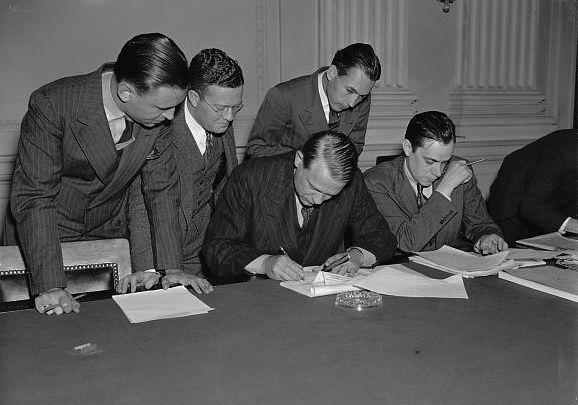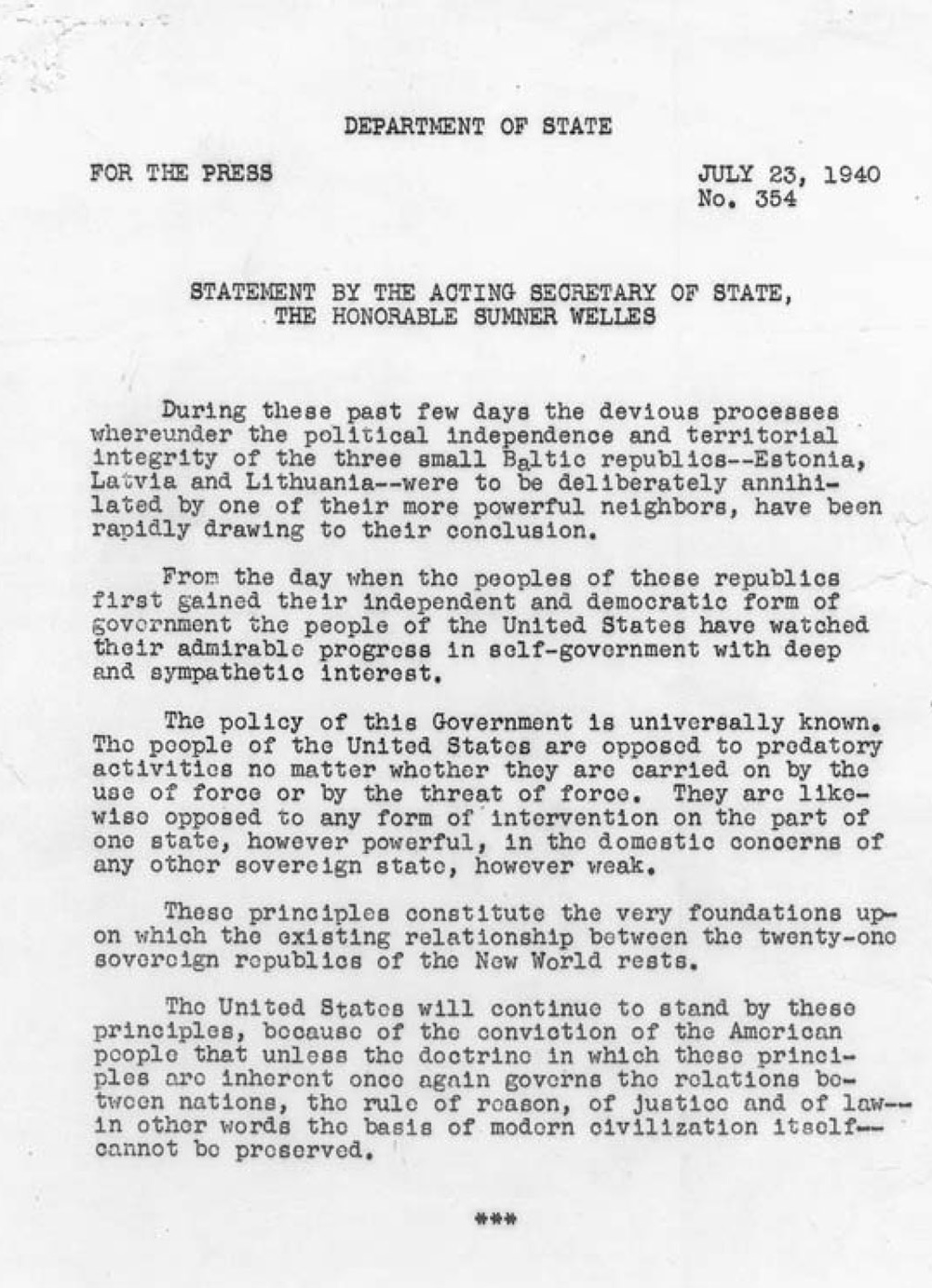|
Sumner Welles
Benjamin Sumner Welles (October 14, 1892September 24, 1961) was an American government official and diplomat in the Foreign Service. He was a major foreign policy adviser to President Franklin D. Roosevelt and served as Under Secretary of State from 1936 to 1943, during Roosevelt's presidency. Born in New York City to a wealthy, well-connected political family, Welles graduated from Harvard College in 1914. He entered the Foreign Service at the advice of Franklin Roosevelt, who was a family friend. Welles was excited by Woodrow Wilson's ideas about how American principles could reorder the international system based on liberal democracy, free-trade capitalism, international law, a league of nations, and an end to colonialism. Welles specialized in Latin American diplomatic affairs and served several posts in Washington and in the field. President Calvin Coolidge distrusted Welles because of his divorce and private sex life. He left public service and from bases in his two m ... [...More Info...] [...Related Items...] OR: [Wikipedia] [Google] [Baidu] |
United States Under Secretary Of State
Under Secretary of State (U/S) is a title used by senior officials of the United States Department of State who rank above the Assistant Secretaries and below the Deputy Secretary. From 1919 to 1972, the Under Secretary was the second-ranking official at the Department of State (immediately beneath the United States Secretary of State), serving as the Secretary's principal deputy, chief assistant, and Acting Secretary in the event of the Secretary's absence. Prior second-ranking positions had been the Chief Clerk, the Assistant Secretary of State, and the Counselor. Prior to 1944, a number of offices in the Department reported directly to the Under Secretary. In July 1972, the position of Deputy Secretary superseded that of Under Secretary of State. The following is a list of current offices bearing the title of "Under Secretary of State": * Under Secretary of State for Political Affairs * Under Secretary of State for Management * Under Secretary of State for Economic Growth, E ... [...More Info...] [...Related Items...] OR: [Wikipedia] [Google] [Baidu] |
Calvin Coolidge
Calvin Coolidge (born John Calvin Coolidge Jr.; ; July 4, 1872January 5, 1933) was the 30th president of the United States from 1923 to 1929. Born in Vermont, Coolidge was a Republican lawyer from New England who climbed up the ladder of Massachusetts state politics, becoming the state's 48th governor. His response to the Boston Police Strike of 1919 thrust him into the national spotlight as a man of decisive action. Coolidge was elected the country's 29th vice president the next year, succeeding the presidency upon the sudden death of President Warren G. Harding in 1923. Elected in his own right in 1924, Coolidge gained a reputation as a small-government conservative distinguished by a taciturn personality and dry sense of humor, receiving the nickname "Silent Cal". Though his widespread popularity enabled him to run for a third term, he chose not to run again in 1928, remarking that ten years as president was (at the time) "longer than any other man has had ittoo long! ... [...More Info...] [...Related Items...] OR: [Wikipedia] [Google] [Baidu] |
Thomas Welles
Thomas Welles (14 January 1660) is the only person in Connecticut's history to hold all four top offices: governor, deputy governor, treasurer, and secretary. In 1639, he was elected as the first treasurer of the Colony of Connecticut, and from 1640 to 1649 served as the colony's secretary. In this capacity, he transcribed the Fundamental Orders into the official colony records on 14 January 1638, OS, (24 January 1639, NS).Norton, pp. 19–21 He was the magistrate during the first witch trials, the Hartford or Connecticut Witch Trials. Biography Welles was born in Tiddington, Warwickshire, England around 1590, the son of Robert Welles and Alice Hunt of Stourton, Whichford, County Warwick, England, born about 1543. He married Alice Tomes on 28 September 1615 at St. Peter's Church, near Banbury, Oxfordshire, England. She was born around 1593 in Long Marston, Gloucestershire, England, the daughter of John Tomes and Ellen (Gunne) Phelps. A brother of Alice Tomes, also named Jo ... [...More Info...] [...Related Items...] OR: [Wikipedia] [Google] [Baidu] |
Caroline Webster Schermerhorn Astor
Caroline may refer to: People *Caroline (given name), a feminine given name * J. C. Caroline (born 1933), American college and National Football League player * Jordan Caroline (born 1996), American (men's) basketball player Places Antarctica * Caroline Bluff, a headland in the South Shetland Islands Australia *Caroline, South Australia, a locality in the District Council of Grant *Hundred of Caroline, a cadastral sub-unit of the County of Grey in South Australia Canada *Caroline, Alberta, a village Kiribati *Caroline Island, an uninhabited coral atoll in the central Pacific Micronesia *Caroline Islands an archipelago in the western Pacific, northeast of New Guinea *Caroline Plate, a small tectonic plate north of New Guinea United States *Caroline, New York, a town *Caroline, Ohio, an unincorporated community *Caroline, Wisconsin, an unincorporated census-designated place *Caroline County, Maryland *Caroline County, Virginia *Fort Caroline, the first French colony in what is now ... [...More Info...] [...Related Items...] OR: [Wikipedia] [Google] [Baidu] |
Reconstruction Era Of The United States
The Reconstruction era was a period in American history following the American Civil War (1861–1865) and lasting until approximately the Compromise of 1877. During Reconstruction, attempts were made to rebuild the country after the bloody Civil War, bring the former Confederate states back into the United States, and to redress the political, social, and economic legacies of slavery. During the era, Congress abolished slavery, ended the remnants of Confederate secession in the South, and passed the 13th, 14th, and 15th Amendments to the Constitution (the Reconstruction Amendments) ostensibly guaranteeing the newly freed slaves ( freedmen) the same civil rights as those of whites. Following a year of violent attacks against Blacks in the South, in 1866 Congress federalized the protection of civil rights, and placed formerly secessionist states under the control of the U.S. military, requiring ex-Confederate states to adopt guarantees for the civil rights of fr ... [...More Info...] [...Related Items...] OR: [Wikipedia] [Google] [Baidu] |
American Civil War
The American Civil War (April 12, 1861 – May 26, 1865; also known by other names) was a civil war in the United States. It was fought between the Union ("the North") and the Confederacy ("the South"), the latter formed by states that had seceded. The central cause of the war was the dispute over whether slavery would be permitted to expand into the western territories, leading to more slave states, or be prevented from doing so, which was widely believed would place slavery on a course of ultimate extinction. Decades of political controversy over slavery were brought to a head by the victory in the 1860 U.S. presidential election of Abraham Lincoln, who opposed slavery's expansion into the west. An initial seven southern slave states responded to Lincoln's victory by seceding from the United States and, in 1861, forming the Confederacy. The Confederacy seized U.S. forts and other federal assets within their borders. Led by Confederate President Jefferson Da ... [...More Info...] [...Related Items...] OR: [Wikipedia] [Google] [Baidu] |
Charles Sumner
Charles Sumner (January 6, 1811March 11, 1874) was an American statesman and United States Senator from Massachusetts. As an academic lawyer and a powerful orator, Sumner was the leader of the anti-slavery forces in the state and a leader of the Radical Republicans in the U.S. Senate during the American Civil War. During Reconstruction, he fought to minimize the power of the ex-Confederates and guarantee equal rights to the freedmen. He fell into a dispute with President Ulysses Grant, a fellow Republican, over the control of Santo Domingo, leading to the stripping of his power in the Senate and his subsequent effort to defeat Grant's re-election. Sumner changed his political party several times as anti-slavery coalitions rose and fell in the 1830s and 1840s before coalescing in the 1850s as the Republican Party, the affiliation with which he became best known. He devoted his enormous energies to the destruction of what Republicans called the Slave Power, that is, to the ending ... [...More Info...] [...Related Items...] OR: [Wikipedia] [Google] [Baidu] |
Groton School
Groton School (founded as Groton School for Boys) is a private college-preparatory boarding school located in Groton, Massachusetts. Ranked as one of the top five boarding high schools in the United States in Niche (2021–2022), it is affiliated with the Episcopalian tradition. Groton enrolls about 380 boys and girls, from the eighth through twelfth grades. It has one of the largest endowments of any prep school in the country at $477,000,000 as of June 30, 2021. Tuition, room and board, and required fees in 2014–2015 amounted to $56,700 (with books extra); 38% of the students receive financial aid. The school is a member of the Independent School League. There are many famous Groton alumni in business and government, including U.S. President Franklin D. Roosevelt. For the 2020–2021 admissions cycle, Groton School reported an acceptance rate of 9%. History Groton School was founded in 1884 by the Rev. Endicott Peabody, a member of a prominent Massachusetts family an ... [...More Info...] [...Related Items...] OR: [Wikipedia] [Google] [Baidu] |
House Un-American Activities Committee
The House Committee on Un-American Activities (HCUA), popularly dubbed the House Un-American Activities Committee (HUAC), was an investigative United States Congressional committee, committee of the United States House of Representatives, created in 1938 to investigate alleged disloyalty and subversive activities on the part of private citizens, public employees, and those organizations suspected of having either Fascism, fascist or Communism, communist ties. It became a standing (permanent) committee in 1945, and from 1969 onwards it was known as the House Committee on Internal Security. When the House abolished the committee in 1975, its functions were transferred to the United States House Committee on the Judiciary, House Judiciary Committee. The committee's anti-communist investigations are often associated with McCarthyism, although Joseph McCarthy himself (as a U.S. Senator) had no direct involvement with the House committee. McCarthy was the chairman of the United States ... [...More Info...] [...Related Items...] OR: [Wikipedia] [Google] [Baidu] |
Cordell Hull
Cordell Hull (October 2, 1871July 23, 1955) was an American politician from Tennessee and the longest-serving U.S. Secretary of State, holding the position for 11 years (1933–1944) in the administration of President Franklin Delano Roosevelt during most of World War II. Before that appointment he represented Tennessee for two years in the United States Senate and twenty-two years in the House of Representatives. Hull received the Nobel Peace Prize in 1945 for his role in establishing the United Nations, and was referred to by President Roosevelt as the "Father of the United Nations". Early life and education Cordell Hull was born in a log cabin in Olympus, Tennessee, which is now part of Pickett County, Tennessee, but was then part of Overton County. He was the third of the five sons of William Paschal Hull (1840–1923) and Mary Elizabeth Hull (née Riley) (1841–1903). His brothers were named Orestes (1868), Sanadius (1870), Wyoming (1875), and Roy (1881). Hull's ... [...More Info...] [...Related Items...] OR: [Wikipedia] [Google] [Baidu] |
Soviet Occupation Of The Baltic States (1940)
The Soviet occupation of the Baltic states covers the period from the Soviet–Baltic mutual assistance pacts in 1939, to their invasion and annexation in 1940, to the mass deportations of 1941. In September and October 1939 the Soviet government compelled the much smaller Baltic states to conclude mutual assistance pacts which gave the Soviets the right to establish military bases there. Following invasion by the Red Army in the summer of 1940, Soviet authorities compelled the Baltic governments to resign. The presidents of Estonia and Latvia were imprisoned and later died in Siberia. Under Soviet supervision, new puppet communist governments and fellow travelers arranged rigged elections with falsified results. Shortly thereafter, the newly elected "people's assemblies" passed resolutions requesting admission into the Soviet Union. In June 1941 the new Soviet governments carried out mass deportations of "enemies of the people". Consequently, at first many Balts greeted the ... [...More Info...] [...Related Items...] OR: [Wikipedia] [Google] [Baidu] |
Welles Declaration
The Welles Declaration was a diplomatic statement issued on July 23, 1940, by Sumner Welles, the acting US Secretary of State, condemning the June 1940 occupation by the Soviet army of the three Baltic countries – Estonia, Latvia, and Lithuania – and refusing to diplomatically recognize their subsequent annexation into the Soviet Union. It was an application of the 1932 Stimson Doctrine of nonrecognition of international territorial changes that were executed by force and was consistent with US President Franklin Roosevelt's attitude towards violent territorial expansion. The 1940 Soviet invasion was an implementation of its 1939 Nazi-Soviet Pact, which contained a secret protocol by which Nazi Germany and Stalinist USSR agreed to partition the independent nations between them. After the pact, the Soviets engaged in a series of ultimatums and actions ending in the annexation of the Baltic states during the summer of 1940. The area held little strategic importance to the U ... [...More Info...] [...Related Items...] OR: [Wikipedia] [Google] [Baidu] |






